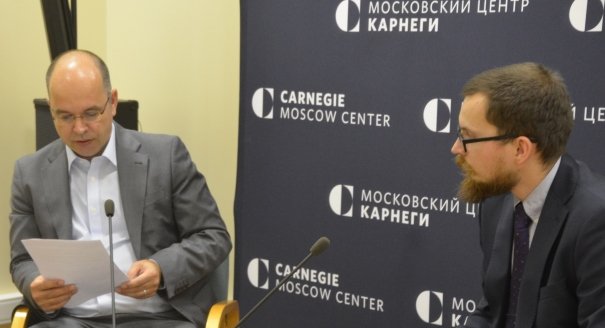Registration
Thank you!
You will receive an email confirming your registration.
In the so-called “postmodern” world, states prefer to use soft power to achieve their foreign policy goals. However, Russia remains tied to a “modern” world where the use of force in foreign policy is considered acceptable. Speaking at an event at the Carnegie Moscow Center, Carnegie Europe’s Ulrich Speck argued that the current conflict between the European Union and Russia is clash between such “postmodern” and “modern” ideals. He discussed how Europe and Germany look at Russia through the prism of the Ukrainian crisis and the prospects for EU/Germany-Russia relations. Carnegie Moscow Center’s Petr Topychkanov moderated.
Discussion Highlights
- Divergent Values in Governance: The EU, led by Germany, wanted to integrate Russia into a web of close politic and trade relationships and to see liberal democracy in Russia, Speck said. But Europe did not realize that, since the end of the Soviet Union, the most powerful voices in the Russian government perceived themselves as heirs to the “modern” Soviet world view. In this paradigm, foreign policy interactions are zero-sum games, territorial control is key, and hard power is an acceptable tool. Speck explained that the EU, which has abandoned hard power for soft power and embraced economic strength through cooperation, saw Ukraine as a path for eventually spreading free market values to Russia. The West had no idea that Russia would see the EU agreements with Ukraine as such a threat. Speck explained that it was a mistake to think that Russia would take up a Western style of governance so easily.
- Today’s State of Affairs: The Western policy toward Russia has failed, and strategic partnership between Russia and the European Union is dead, Speck said. Europe cannot go back to pre-Ukraine state and will not return to “business as usual” with Russia. There may not be a cold war between the EU and Russia, but their future will be one of mixed conflict and cooperation.
- Germany: When the conflict broke out in Eastern Ukraine, a majority in Germany was sympathetic to an assumed unrepresented Ukrainian population. However, when it became clear that Russia was behind this conflict, this sympathy was wholly retracted, Speck explained. Now, he added, Russia has lost Germany as an advocate and mediator.
- Western Sanctions: Speck explained that the sanctions were an act of strong commitment by twenty-eight states who participated in forming and implementing them. They will not easily be lifted because all these counties must cooperate again to lift them. It would take some very tangible changes on Russia’s part to change the status of sanctions.
- “Frozen Conflicts” in the Post-Soviet Space: To maintain influence in the post-Soviet space, Russia wants to have “frozen conflicts” there, Speck said, defining frozen conflicts as situations in which active armed conflict has been brought to an end, but no peace treaty or other political framework resolves the conflict to the satisfaction of the combatants. But the conflict in Ukraine is the first postmodern “frozen conflict”: while other “frozen conflicts” have come from real conflicts with actual origins, this one, in Speck’s opinion, has been totally engineered.
- Crimea: The EU will not recognize Crimea as part of Russia; however, its annexation will not get in the way of future relations with Russia, Speck said.
Political ReformDemocracyEconomySecurityForeign PolicyRussiaEastern EuropeUkraineWestern EuropeGermany
